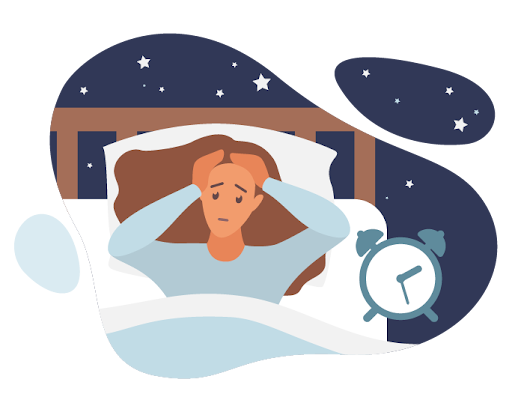
Picture this: it’s 2:00 a.m. Your eyes are heavy, but your brain is buzzing with random thoughts. You toss and turn, knowing you’ll feel awful tomorrow. Morning comes — and sure enough, you’re sluggish, foggy, maybe even a little hopeless. You cancel plans. You move less. And that night? You’re wide awake again.
Sounds familiar?
You might be caught in the sleep-depression cycle — a sneaky loop that can be tough to break without understanding what’s really going on in the brain.
It goes like this:
😴 Poor sleep → 😞 low mood and lack of motivation → 🛋️ inactivity → 🌙 too much mental energy at night → 😴 even worse sleep.
Over time, this cycle can lead to chronic insomnia and even clinical depression.
Research backs this up:
📚 A 2006 study in Sleep found that people with insomnia were four times more likely to develop depression.
🧠 And in brain imaging studies, sleep-deprived people show increased activity in emotional centers like the amygdala, making them more reactive and anxious.
In short: when the brain doesn’t rest, it can’t regulate emotions — and depression creeps in.
When we don’t get enough deep, restorative sleep, the brain can’t reset. Daytime feels heavy. Thinking is slow. You might withdraw or avoid stimulation — which sounds like rest, but actually keeps your brain under-engaged.
The problem?
🧠 A brain that doesn’t expend energy by day often won’t settle down at night.
We see this in EEG research and clinical practice: people with depression and sleep issues often show low daytime brain activation and excess high-frequency activity at night — the classic “tired but wired” state.
Understanding how sleep affects mental health and vice versa is crucial for recovery. It’s not just about “trying harder” to sleep or feel better — it’s about helping the brain re-learn when to be active and when to rest.
Small shifts can make a difference:
✔️ Move your body during the day
Even a short walk or light stretching builds up sleep pressure — helping your brain know when it’s time to wind down later.
✔️ Stick to consistent routines
Waking and sleeping at the same time each day trains your internal clock, even if your sleep quality is still improving.
✔️ Reduce nighttime stimulation
Avoid screens, caffeine, and emotionally intense conversations before bed. Give your brain space to slow down.
✔️ Try brain-based support like neurofeedback
Neurofeedback therapy can gently help the brain shift its patterns — promoting better regulation of arousal, rest, and emotional balance.
If you’re stuck in this cycle, know this:
You’re not alone — and you’re not broken.
Poor sleep can impact your mental health.
And depression can disrupt your sleep.
But neither defines you.
With the right tools, your brain can relearn its natural rhythm.
You can rest.
You can feel more like yourself again.
At NeuroClinic, we support clients who are dealing with sleep issues, depression, or both. We use gentle, brain-based therapies like neurofeedback to help the nervous system regulate itself — so you can start feeling better from the inside out.
We’re here when you’re ready.
Get golden tips and resources to your inbox bi-weekly!
Plus receive a FREE bonus gift when you sign up 🎁
Thank you for subscribing!
You’re in! Don’t forget to check your promotions.
